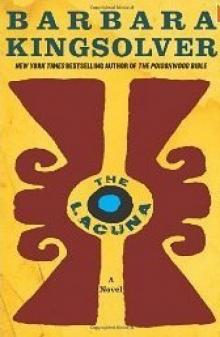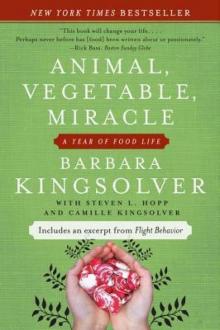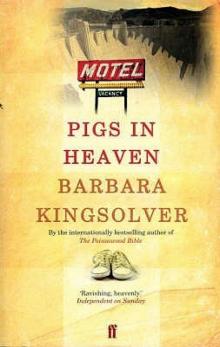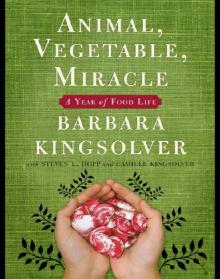- Home
- Barbara Kingsolver
High Tide in Tucson Page 6
High Tide in Tucson Read online
Page 6
On Christmas morning I received white rubber boots with treads like a pair of Michelins. My mother loved me, but had missed the point.
In high school I took matters into my own hands. I learned to sew. I contrived to make an apple-green polyester jumpsuit that was supremely fashionable for about two months. Since it took me forty days and forty nights to make the thing, my moment of glory was brief. I learned what my mother had been trying to tell me all along: high fashion has the shelf life of potato salad. And when past its prime, it is similarly deadly.
Once I left home and went to college I was on my own, fashion-wise, having bypassed my cousin in stature and capped the arrangement off by moving to another state. But I found I still had to reckon with life's limited choices. After classes I worked variously as a house cleaner, typesetter, and artists' model. I could spend my wages on trendy apparel (which would be useless to me in any of my jobs, particularly the latter), or on the lesser gratifications of food and textbooks. It was a tough call, but I opted for education. This was Indiana and it was cold; when it wasn't cold, it was rainy. I bought an army surplus overcoat, with zip-out lining, that reached my ankles, and I found in my parents' attic a green pith helmet. I became a known figure on campus. Fortunately, this was the era in which army boots were a fashion option for coeds. And besides, who knew? Maybe under all that all-weather olive drab was a Bobbie Brooks sweater. My social life picked right up.
As an adult, I made two hugely fortuitous choices in the women's-wear department: first, I moved out West, where the buffalo roam and hardly anyone is ever arrested for being unstylish. Second, I became a novelist. Artists (also mathematicians and geniuses) are greatly indulged by society when it comes to matters of grooming. If we happen to look like an unmade bed, it's presumed we're preoccupied with plot devices or unifying theories or things of that ilk.
Even so, when I was invited to attend an important author event on the East Coast, a friend took me in hand.
"Writers are supposed to be eccentric," I wailed.
My friend, one of the people who loves me best in the world, replied: "Barbara, you're not eccentric, you're an anachronism," and marched me down to an exclusive clothing shop.
It was a very small store; I nearly hyperventilated. "You could liquidate the stock here and feed an African nation for a year," I whispered. But under pressure I bought a suit, and wore it to the important author function. For three hours of my life I was precisely in vogue.
Since then it has reigned over my closet from its dry-cleaner bag, feeling unhappy and out of place, I am sure, a silk ambassador assigned to a flannel republic. Even if I go to a chichi restaurant, the suit stays home. I'm always afraid I'll spill something on it; I'd be too nervous to enjoy myself. It turns out I would rather converse than make a statement.
Now, there is fashion, and there is style. The latter, I've found, will serve, and costs less. Style is mostly a matter of acting as if you know very well what you look like, thanks, and are just delighted about it. It also requires consistency. A friend of mine wears buckskin moccasins every day of her life. She has daytime and evening moccasins. This works fine in Arizona, but when my friend fell in love with a Tasmanian geologist and prepared to move to a rain forest, I worried. Moccasins instantaneously decompose in wet weather. But I should have known, my friend has sense. She bought clear plastic galoshes to button over her moccasins, and writes me that she's happy.
I favor cowboy boots. I don't do high heels, because you never know when you might actually have to get somewhere, and most other entries in the ladies-shoes category look to me like Ol' Dixie and Ol' Dobbin trying to sneak into the Derby, trailing their plow. Cowboy boots aren't trying. They say, "I'm no pump, and furthermore, so what?" That characterizes my whole uniform, in fact: oversized flannel shirts, jeans or cotton leggings, and cowboy boots when weather permits. In summer I lean toward dresses that make contact with the body (if at all) only on the shiatsu acupressure points; maybe also a Panama hat; and sneakers. I am happy.
I'm also a parent, which of course calls into question every decision one ever believes one has made for the last time. Can I raise my daughter as a raiment renegade? At present she couldn't care less. Maybe obsessions skip a generation. She was blessed with two older cousins whose sturdy hand-me-downs she has worn from birth, with relish. If she wasn't entirely a fashion plate, she also escaped being typecast. For her first two years she had no appreciable hair, to which parents can clamp those plastic barrettes that are gender dead giveaways. So when I took her to the park in cousin Ashley's dresses, strangers commented on her blue eyes and lovely complexion; when she wore Andrew's playsuits emblazoned with trucks and airplanes (why is it we only decorate our boys with modes of transportation?), people always commented on how strong and alert my child was--and what's his name?
This interests me. I also know it can't last. She's in school now, and I'm very quickly remembering what school is about: two parts ABCs to fifty parts Where Do I Stand in the Great Pecking Order of Humankind? She still rejects stereotypes, with extraordinary good humor. She has a dress-up collection to die for, gleaned from Goodwill and her grandparents' world travels, and likely as not will show up to dinner wearing harem pants, bunny ears, a glitter-bra over her T-shirt, wooden shoes, and a fez. But underneath it all, she's only human. I have a feeling the day might come when my daughter will beg to be a slave of conventional fashion.
I'm inclined to resist, if it happens. To press on her the larger truths I finally absorbed from my own wise parents: that she can find her own path. That she will be more valued for inward individuality than outward conformity. That a world plagued by poverty can ill afford the planned obsolescence of haute couture.
But a small corner of my heart still harbors the Bride of Frankenstein, eleven years of age, haunting me in her brogues and petticoats. Always and forever, the ghosts of past anguish compel us to live through our children. If my daughter ever asks for the nineties equivalent of go-go boots, I'll cave in.
Maybe I'll also buy her some of those clear plastic galoshes to button over them on inclement days.
THE HOUSEHOLD ZEN
In Barbara Pym's novel Excellent Women, published in 1952, there's a moment when our heroine pays a call on her new downstairs neighbor, a dubious kind of woman who wears trousers and is always dashing off to meetings of the Anthropological Society. When this woman answers the door, she shrugs without remorse at her unkempt apartment and declares, "I'm such a slut."
Wonderful word. Like so many others--gay, pill, roommate--it's acquired a sexual edge since the fifties, and it's too bad about slut, because the language needs a word to describe this particular relationship to housework. Something to tell the UPS man.
A select group of friends and I have formed a secret slut society. We wear trousers, we have fascinating work, and it's possible that the dust bunnies under our beds could be breeding dust bison. It's pretty shocking. In our lives we've seen revolutions in birth control and microchips and air bags, and all these are nothing compared to what's happened to housework. Interestingly, technology has nothing to do with it.
"We had a dishwasher, but my mother insisted you had to scrub and rinse every dish before you loaded it in," one of my colleagues in sluthood recalled as we sat around drinking something instant. The rest of us knew the story. The Kitchen Mystique. Dad gives Mom a microwave--a putative labor-saving device--and she reorganizes the whole kitchen as if the family had gone kosher, creating a supernatural order of kitchenware, some of which can go in the microwave and some of which will, she is sure, blow up in there. Melmac bombs.
My friend Jane dates a turning point in her life to the day in childhood when she drew a diagram of the vacuum cleaner before taking it out of the closet. When she finished vacuuming she put it away, every loop and coil scientifically in place, then silently watched her mother take it out and do it over again, claiming as always that it wasn't properly put away.
Cleaning houses in 1960 took nin
ety hours a week and the mind of a rocket scientist. Cleaning my house, in the nineties, takes a lick and a promise. Maybe fifteen adult-hours per week, for everything: laundry, dishes, a semiannual dust-bison roundup. The vacuum cleaner can stand on its head in the closet for all I care. I've discovered that almost any two things can be laundered together, and that the dishwasher will actually wash dishes if left to its own devices. Once in a blue moon my daughter's ballet tights will shrink and the forks won't entirely come clean; I donate them to the hand-me-down bag and run them through again, respectively. In these matters, it seems to me, an ounce of cure is worth a lifetime of prevention.
How did housework get to be so easy? I spent years wondering, until it dawned on me I was asking the wrong question. Why was it ever hard? I don't mean in the days of slogging clothes against rocks in the river, I mean in the days between our fore-mothers' competent Maytag and mine. Why did Donna Reed's house demand a full-time wife whereas mine asks for an occasional date? Because of historical necessity, pure and simple. In the fifties and sixties the economy boomed. One breadwinner could feed a family, and the social order demanded that Rosie the Riveter get out of the factory and into the kitchen. Betty Friedan, in The Feminine Mystique, chronicled the sociology of this period through an analysis of women's magazines, and it's pretty alarming to see how a culture gets rearranged by means of glossy paper. For the first time in history, through every means possible, housework was elevated from humble necessity to career status.
If the working-class women of my mother's generation had been born in any other time, they would have led other lives--not necessarily better or worse, but definitely other. A decade earlier, they might have built airplanes and let the devil and Hitler take the daily dusting. Ten years later, they could have had Ph.D.s in aeronautics. Women, unless they were quite wealthy, have always worked: in the house and out of the house, on the farm, in factories, sometimes caring for other people's kids, often leaving their own with the family herd under grandma's practiced eye. I've read that early in this century, when desperate families flooded into cities seeking work, leaving their rural support systems behind, female factory workers had to bundle their toddlers up on boards and hang them on hooks on the walls. At break time they'd unswaddle the kids and feed them. I like to mention this to anyone who suggests that modern day care is degrading the species.
Sometimes, when I'm trapped and have to listen to such stuff, I hear men of an evangelical bent explain that all our problems would end if women would just tend to housework and children as they have for two thousand years. Problem is, we are tending those things, but few of us have the option of doing it without also holding down a job that pays real money. Homemaking is moot if you're homeless. What the televangelists are invoking as the natural order is actually an artifice of a postwar economy, a kind of household that was practicable for just about twenty years. Not two thousand. Picture a medieval Donna Reed, if you will. Doesn't wash.
Whatever anyone might like to pretend, the fact is we're living in a country that can't--or in any event, doesn't--guarantee support for a spouse who does housework. And you don't get Toll House cookies without the toll. Behind the nostalgic call for women to return to tidying up the cottage is the supposition that some burly fellow will always be there to keep the wolf from the door. This fairy tale has lost its powers of persuasion. Half of all marriages undertaken since 1960 didn't last for the anticipated eternity. It's been a great disenchantment for all in the magic kingdom, no doubt, but the statistics on what follows are a shock that gets your feet back on the ground: after divorce, a man's expendable income is overwhelmingly likely to increase, while a woman's plummets, along with her children's standard of living. The reason for this is clear enough. Hours logged on Kinder and kitchen don't add up to tenure and a retirement plan.
Given that we have to make our own way in this big old world, it seems rude to try to make women (or men) feel guilty about neglecting the household operation. Cleanliness is next to godliness only if you're God's Wife. Guiding and nourishing a flock of the very young--your own or someone else's--is a career, there's no doubt about it. But housework is mostly about dirt. Other people's. The world's most renewable resource.
It seems incredible that some twenty years' worth of magazines could glorify the routine maintenance of marginally grateful sock-dropping families. I'm embarrassed about my own selfish participation in that experiment. For years I was determined to make it up to my mother. She has a job, now that we've all flown far from the nest, and I craved to ease her burden. Whenever she'd come to visit I would subtly try to demonstrate that housework could be the next best thing to nothing at all. "Let's all just pick up our plates," I'd say cheerfully at the end of a meal, "and put them straight in the dishwasher." I felt shaky and heretical, as if I were suggesting to a priest that we spread Cheez Whiz on the wafers to make them more tasty. But I did it anyway. Right before Mom's very eyes I threw a pair of green socks in with the sheets.
Guess what? She already knew. She's no fool. Dad even cooks breakfast now.
I'm starting to see what my friend Jane, the scientific illustrator of vacuum cleaners, learned at age twelve: that in every profession, housewifery included, the necessity of feeling needed is the mother of inventive rules, some of which can't be penetrated by science. The process is separate from the product, and simple isn't what everybody needs, at every stage. Our work is how we define ourselves--so says every sociologist from Maria Montessori to Bruce Springsteen. If you work in the kitchen and have the mind of a rocket scientist, you're going to organize your cupboards like Mission Control. Nobody will know their way around it as well as you do. It needs to be that way. The gift of a microwave is an insult, if it suggests you could be replaced by the twist of a knob and a loud ding.
A generation of American women served their nation by being the Army of Moms, and they spent their creative force like the ancient Furies, whipping up cakes and handmade Christmas gifts and afterschool snacks, for a brief time in human history raising the art of homemaking high above the realm of dirt. Some of them fell as casualties to their era, and some won the medal of honor. Either way, they left a lot of us lucky baby boomers with strong teeth and bones and a warm taste of childhood in our mouths. No wonder those old boys are nostalgic. I am too.
Well, but I can also get nostalgic for the childhood of Laura Ingalls Wilder, until it dawns on me that not once, in any of those Little House books, does she discuss the real meaning of life without plumbing on howling cold prairie nights. Every epoch has its prizes and punishments, and there's no point in wishing my own were any different. The lot I drew in history was to belong to the generation of women groomed implicitly for wifehood, but who have ended up needing to win their bread rather than bake it. I've always been happy enough to do it, though now that I'm also supporting a child on my own, I occasionally wake up at night in a cold sweat on account of it; no part of my upbringing ever prepared me to hold this place at the head of the table. But it's a blessing, I think, to my girl, who is growing up convinced that women belong in the halls of discovery, production, and creation--messy enterprises all. It wouldn't even occur to her to doubt it. We've spent far more time together making kites and forts and scientifically mounted bug collections than working on hospital corners, and if her bed doesn't even get made, I'm the last to notice. Sluthood has its privileges, for children too.
Housework, like the Buddha, takes many forms, depending on what is in your heart as you approach it. I personally am inclined to approach it the way governments treat dissent: ignore it until it revolts. If life were a different house of cards, though, and if housework were my life, you can bet it would acquire a heck of a lot of cachet. I would write book-length grocery lists, and serve meals that Proust would remember longer than those madeleines of his (whatever they were). Virtue in my living room would have the aroma of Lemon Fresh Pledge. My kitchen would be as cryptic as the streets of Venice, and I would be irreplaceable. The burly fellow
in charge of keeping the wolf from my door would be lost without me, and I don't mean maybe. Some of those seemingly innocent dishes in my cabinet might be Molotov Melmac waiting to explode in the microwave. Really. I would never tell which ones.
SEMPER FI
Maybe this has happened to you: You are curled up on the sofa, with an afghan maybe, and the person you love is there too. You are female, because, I'm sorry, but I have the typewriter and you have to be what I say. And he is male. He is watching a contest of an athletic nature on TV, and you, well, you are present and accounted for. The contest is basketball, say, UCLA against Duke, in the NCAA playoffs. He's rooting for UCLA. You are confused. You were under the impression that he despised UCLA with a purple passion.
"Two weeks ago," you point out carefully, in the interest of scientific inquiry, "you were calling UCLA a bunch of galoots. You said they couldn't hit the side of a barn."
"Two weeks ago they were playing us. But now Arizona's out of the tournament," he explains, in that masculine sort of voice that can make any wild thing sound reasonable.
"But it's the same players," you persist, not wanting to make a fuss, but really. Once a galoot, always a galoot, it would seem to you. Nobody changes that much in two weeks, barring a religious experience, or steroids.
He sighs then, and patiently explains the hierarchy of loyalties: First you root for your home team. Then, if they're out of the picture, you root for other members of your conference.
"Even the Sun Devils?" you ask, dismayed. The Devils are your hometown team's nearest and bitterest rivals. The peak experience for a Devils fan is to sneak into Tucson and paint some important civic landmark such as the mayor in their school's colors.
"If the Devils were the only PAC 10 team left in the tournament, then sure, I'd want them to win." In an entirely even tone he says this perfectly preposterous thing, as if he is a chemistry professor announcing to an earnest, note-taking classroom that a new element in the periodic table of elements has been named after Donald Duck.

 Prodigal Summer: A Novel
Prodigal Summer: A Novel Animal Dreams: A Novel
Animal Dreams: A Novel The Poisonwood Bible
The Poisonwood Bible High Tide in Tucson
High Tide in Tucson The Lacuna
The Lacuna The Bean Trees
The Bean Trees Animal, Vegetable, Miracle: A Year of Food Life
Animal, Vegetable, Miracle: A Year of Food Life Pigs in Heaven
Pigs in Heaven Small Wonder
Small Wonder Flight Behavior
Flight Behavior Homeland and Other Stories
Homeland and Other Stories How to Fly (In Ten Thousand Easy Lessons)
How to Fly (In Ten Thousand Easy Lessons) Unsheltered
Unsheltered Animal Dreams
Animal Dreams Prodigal Summer
Prodigal Summer Animal, Vegetable, Miracle
Animal, Vegetable, Miracle